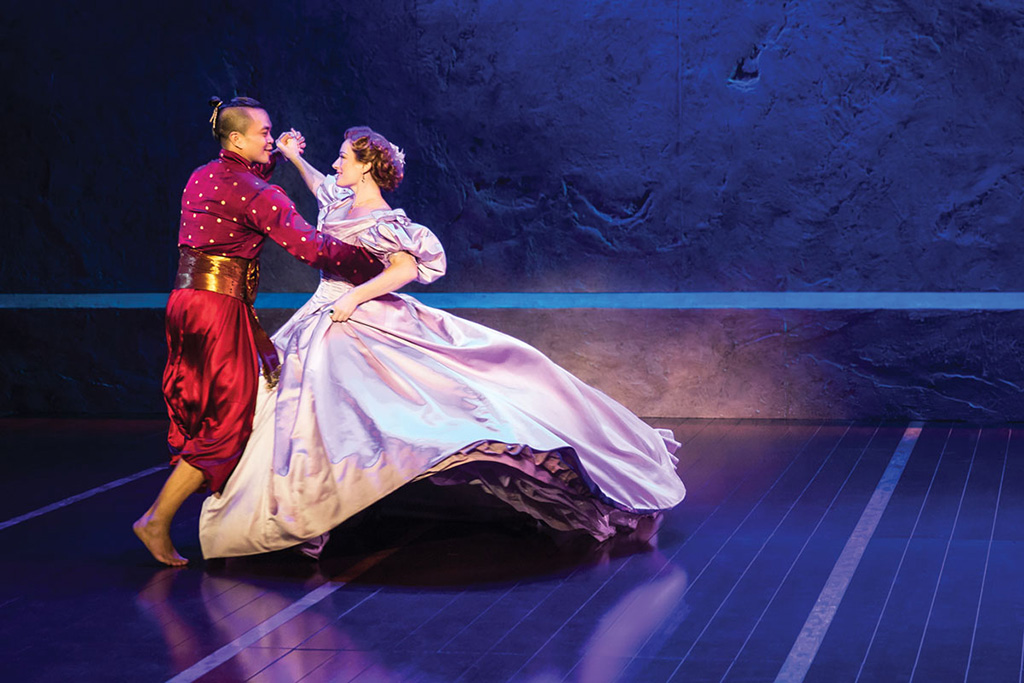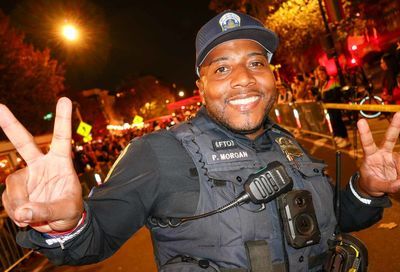Review: The King and I at Kennedy Center
Gorgeous to behold, and as old-fashioned as they come, The King and I dances into the Kennedy Center
By André Hereford on July 27, 2017 @here4andre

From the opening strains of its lush overture, The King and I (★★½) announces its commitment to pomp and pageantry. Currently filling the Kennedy Center Opera House, Lincoln Center Theater’s Tony-winning revival of Rodgers and Hammerstein’s beloved musical is cast with greater sensitivity towards verisimilitude than that original 1951 production.
But in every other sense, this story of the slaveholding king of Siam and the British governess who steals his heart is still the same old The King and I. Director Bartlett Sher’s sumptuous rendition is engineered to please both Rodgers & Hammerstein fans and musical theater traditionalists. It is not a destination for the artistically adventurous.
However, much of it is quite pleasing, starting with Laura Michelle Kelly’s performance as Anna Leonowens. The real-life Leonowens, an Englishwoman claiming to be Welsh, traveled in 1862 to Bangkok at the behest of King Mongkut, who sought a Western woman to instruct and raise his many royal children. Leonowens is depicted as refined yet headstrong, a widowed single mother who brings a bracing air of modernity — along with her precocious young son Louis (Graham Montgomery) — to the king’s regimented palace.
Kelly comports her Anna with the poise of an educated, well-mannered lady without ever seeming stuffy, and she delivers the show’s famous tunes in a warm, supple soprano that bears both humor and wisdom. The governess spends much of the story at odds with the proud, imperious King (Jose Llana), and with his first wife of a dozen, Lady Thiang (Joan Almedilla), and Kelly shores up Anna’s warmth and vulnerability with impressive backbone. She and the king bicker and negotiate with conviction.
Their budding romance, however, is rendered so chastely that any attraction barely registers. The love story between Anna and the King doesn’t engage dramatically so much as it simply plugs along, because that’s what it’s supposed to do. Llana is a convincing king, but not the most persuasive romantic lead. Instead, he leans into the comedy, which he plays broadly, though with an assured sense of where to find every joke and innuendo. A veteran of Sher’s Broadway production, Llana’s comfort in the King’s skin helps soften some of the character’s harder edges.
Intent on protecting his kingdom from colonial powers, the King is determined to project to the world an image of strength, stability, and enlightenment. Still, he considers women lesser creatures than men, and accepts from the King of Burma the gift of a slave girl, Tuptim (Manna Nichols), for whom freedom means joining her true love, Lun Tha (Kavin Panmeechao). Nichols positively shines as an unwavering, dulcet-voiced Tuptim. Unfortunately, as her paramour, Panmeechao’s nasal tone disrupts the harmonies of the lovers’ duets. His Lun Tha seems no match for the steely Tuptim.

On the other hand, as the King’s eldest son Crown Prince Chulalongkorn, Anthony Chan projects massive presence, as does Almedilla, as Lady Thiang, the kingdom’s de facto queen, who must keep organized a royal household, along with complex emotions and loyalties.
Rodgers and Hammerstein’s presentation of human rights and gender dynamics might have seemed at least slightly progressive in 1951, but the social and cultural messages read as patronizing today. The piece uses Uncle Tom’s Cabin — re-imagined as “The Small House of Uncle Thomas” ballet — to illustrate the inhumanity of enslavement, a move that, at best, risks appearing a bit trite. At worst, it exemplifies just how square The King and I can be — and sound. The arrangements of the waltz and ballad-heavy score don’t dance or flow with much verve, save for that of the classic “Shall We Dance.” Even the Uncle Tom ballet gasps for momentum.
It’s better to focus on the period romance and meaningful cultural exchange. Or, if that doesn’t work, just soak up the opulence. Sher’s staging deploys a few potent visual reveals, Catherine Zuber’s costumes are exquisite, and scenic designer Michael Yeargan’s sets accomplish much with plush, well-lit curtains and intricately decorated flying columns. The choreography, by Christopher Gattelli, based on Jerome Robbins’ dances for the ’51 original, beautifully adds ballet to the mix. If nothing else, this is a production that will dazzle with splendour, even if the underlying musical is showing its age.
The King and I runs to August 20 at the Kennedy Center Opera House. Tickets are $59 to $149. Call 202-467-4600, or visit kennedy-center.org.

The Nourish Festival Feeds the Mind, Body and Soul
It's the perfect "balance between education and enjoyment," says the Kennedy Center's Kate Villa of the month-long event.
By Randy Shulman on October 14, 2024 @RandyShulman
“It's all about nourishing yourself -- mind, body, and soul through the arts,” says Kate Villa. The Kennedy Center’s Director of Comedy and Institutional Programming is telling me about “Nourish,” an array of events centered on “the profound impact of food and artistic expression on our lives.”
The arts and wellness festival, which places a strong emphasis on food, runs through the end of October at the nation’s performing arts center in Washington, D.C.
“I'm excited to bring in the culinary arts because it's something that's underappreciated as an art form,” Villa, her jet-black hair styled in a short, Ina Garten-inspired bob, says during an energetic and wide-ranging conversation one crisp fall morning.
The WNO’s ‘Fidelio’ Both Hits and Misses
Francesca Zambello’s potent vision isn’t quite enough to lift "Fidelio" beyond more than a few inspired moments.
By Randy Shulman on November 1, 2024 @RandyShulman
Opera may not be the nimblest of the arts, but in choosing Beethoven’s Fidelio, Francesca Zambello’s production lands right on time.
From the opera’s theme of political imprisonment to S. Katy Tucker’s haunting intro projections of prisons, actual political prisoners, and snippets of poignant Constitutional rights, its relevance is given in no uncertain terms.
Indeed, reports that a particular presidential candidate has discussed using the military to control the “enemy within” only adds to its prescience.
That said, Zambello’s potent vision isn’t quite enough to lift this production beyond more than a few inspired moments and the chance to hear conductor Robert Spano deliver the composer’s only opera (an experience Beethoven hated so much, he vowed never to attempt another one).
The WNO’s ‘Macbeth’ is a Soaring Operatic High
If you see one opera this season, let it be WNO's "Macbeth," Verdi's journey into the dark heart of the Scottish play.
By Kate Wingfield on November 17, 2024
READ THIS REVIEW IN THE MAGAZINE
Imaginative and powerfully delivered, the Washington National Opera's Macbeth is the opera to drop everything and see. Verdi's gorgeously dramatic distillation of Shakespeare's tragedy is already ever-so-accessible, the dark and swooping grandeur of his score the perfect medium for the tale's high drama and mystery.
Add director Brenna Corner's elegantly innovative vision and this is classical opera for the 21st century at its best: so good it needs no compromises. If you have even the slightest interest in seeing the real deal, this is the one for you. If you are already in, this will be a treasure trove of pleasures.
Support Metro Weekly’s Journalism
These are challenging times for news organizations. And yet it’s crucial we stay active and provide vital resources and information to both our local readers and the world. So won’t you please take a moment and consider supporting Metro Weekly with a membership? For as little as $5 a month, you can help ensure Metro Weekly magazine and MetroWeekly.com remain free, viable resources as we provide the best, most diverse, culturally-resonant LGBTQ coverage in both the D.C. region and around the world. Memberships come with exclusive perks and discounts, your own personal digital delivery of each week’s magazine (and an archive), access to our Member's Lounge when it launches this fall, and exclusive members-only items like Metro Weekly Membership Mugs and Tote Bags! Check out all our membership levels here and please join us today!
The Magazine
-
Most Popular
 'Wicked' is Overstuffed and Undercooked
'Wicked' is Overstuffed and Undercooked  Crowd Cheers as Trans Women Beaten in Minneapolis
Crowd Cheers as Trans Women Beaten in Minneapolis  Gay Adult Film Star Blasted for Hailing Trump's Victory
Gay Adult Film Star Blasted for Hailing Trump's Victory  Jussie Smollett's Conviction for Hate Crime Hoax Reversed
Jussie Smollett's Conviction for Hate Crime Hoax Reversed  Signature's 'Forum' is an Uproarious Roman Holiday
Signature's 'Forum' is an Uproarious Roman Holiday  Predator Meets Prey in Gay Cruising Allegory
Predator Meets Prey in Gay Cruising Allegory  12 Maryland College Students Use Grindr to Assault a Gay Man
12 Maryland College Students Use Grindr to Assault a Gay Man  'Gladiator II' is a Thrilling Roman Fight Club
'Gladiator II' is a Thrilling Roman Fight Club  A Grim Report Details Anti-Trans Violence in America
A Grim Report Details Anti-Trans Violence in America  Same-Sex Kiss Cut from 'Gladiator II'
Same-Sex Kiss Cut from 'Gladiator II'
 Jussie Smollett's Conviction for Hate Crime Hoax Reversed
Jussie Smollett's Conviction for Hate Crime Hoax Reversed  Crowd Cheers as Trans Women Beaten in Minneapolis
Crowd Cheers as Trans Women Beaten in Minneapolis  This Week's Advertisers: J.Paul - The Soprano, Nov. 21, 2024
This Week's Advertisers: J.Paul - The Soprano, Nov. 21, 2024  'Gladiator II' is a Thrilling Roman Fight Club
'Gladiator II' is a Thrilling Roman Fight Club  'Wicked' is Overstuffed and Undercooked
'Wicked' is Overstuffed and Undercooked  Sarah McBride Criticized for Complying with Restroom Ban
Sarah McBride Criticized for Complying with Restroom Ban  Man Sentenced to Life for Murder of Gay Jewish Student
Man Sentenced to Life for Murder of Gay Jewish Student  Speaker Mike Johnson Imposes a Trans Restroom Ban
Speaker Mike Johnson Imposes a Trans Restroom Ban  Gay People Targeted with 'Re-Education Camp' Texts
Gay People Targeted with 'Re-Education Camp' Texts  A Grim Report Details Anti-Trans Violence in America
A Grim Report Details Anti-Trans Violence in America
Scene
Metro Weekly
Washington's LGBTQ Magazine
P.O. Box 11559
Washington, DC 20008 (202) 638-6830
About Us pageFollow Us:
· Facebook
· Twitter
· Flipboard
· YouTube
· Instagram
· RSS News | RSS SceneArchives
Copyright ©2024 Jansi LLC.









You must be logged in to post a comment.